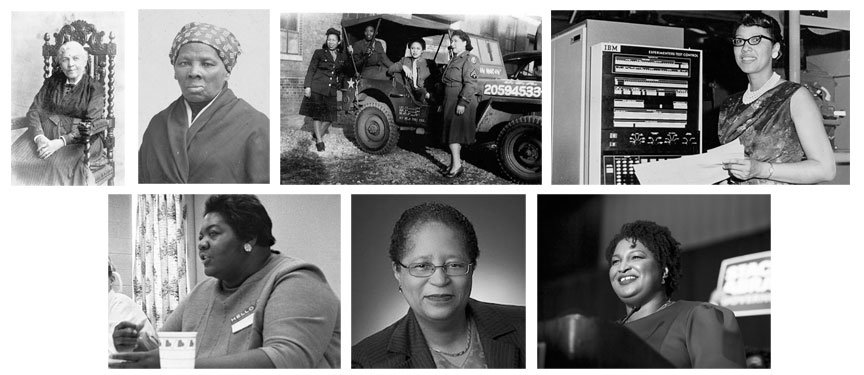ANTI-RACISM RESOURCES CELEBRATING WOMEN’S HISTORY MONTH 2022
Compiled by Darliene Howell
Each month, we will be featuring educational resources on the NAAFA Community Voices Blog. Some resources will be historic information about systemic racism. Others will be resources on doing the internal work of understanding ourselves and how we play a part in that system. There will also be actions that can be taken to directly oppose racism. This month, we focus on Women’s History Month 2022 and Black women that everyone should know. The breadth of the contributions of Black women to the U.S. is immeasurable. There are too many to recognize in this compilation, so here are just a few.
Harriet Jacobs (1813 - 1897) thoughtco.com
Born into slavery, Harriet Jacobs spent her early years abused by a violent enslaver. She planned her escape by hiding in her grandmother's attic for seven years. With a $100 reward for her capture for being a "runaway", she was smuggled to by a boat captain to Philadelphia for a price. She later moved to New York and worked as a nurse and became a part of the abolitionist movement. She wrote her autobiography, Incidents in the Life of a Slave Girl, which talked of sexual abuse and harassment of enslaved women.
Harriet Tubman (1822 - 1913) - history.com
Most people whoknow the name "Harriet Tubman" know of her escape from slavery and her work with the Underground Railroad. Fewer may know of her work during the Civil War as a laundress, opening a wash house and a nurse much less her work as a spy and military leader. Harriet partnered with the commander of the Second South Carolina Volunteers, a Black regiment. Together, they planned a raid to rescue enslaved people and saved more than 700 people. Harriet was a true hero but was never compensated for her efforts "because she was a woman". The recent film Harriet gives a glimpse into the extraordinary life of Harriet Tubman.
The Women’s Army Corp 6888 Unit (1945-1946) - history.com
This World War II Central Postal Directory Battalion was a unit of 855 Black women and was responsible for clearing a two-year backlog of mail for Americans stationed in Europe. Their motto was, “No mail, low morale.” As the largest contingent of Black women to ever serve overseas, they dispelled stereotypes and represented a change in racial and gender roles in the military.
Dorothy Vaughan (1910 - 2008) - thoughtco.com
Dorothy Vaughan was a mathematician and computer. She was the first Black woman to hold a supervisory position at NASA and helped transition the institution to using computers in the space program by teaching herself FORTRAN. The popular feature film, Hidden Figures brought the achievements of Ms. Vaughan and other Black women in NASA to the public's attention.
Ann G. Atwater (1935-2016) - blackpast.org
Activist and fierce defender of civil rights, Ann Atwater was a part of Operation Breakthrough in Durham, North Carolina in the 1960s. In 1971, Ann co-chaired with then-Klansman C.P. Ellis, a 10-day event called "Save Our Schools". It resulted in the integration of Durham City schools and a life-long friendship with C.P., who left the Klan because of what he learned working alongside a Black woman to improve education for children of all colors. This incredible story was featured in the film The Best of Enemies.
Shirley Ann Jackson, PhD (1946 - ) - black-inventor.com
Dr. Jackson, a theoretical physicist and inventor has a distinguished career in the fields of science and technology. Advances in telecommunications research led to breakthroughs in research that enabled the development of the portable fax, touch tone telephone, solar cells, fiber optic cables and the technology behind caller ID and call waiting. She has held many honors over her career and is currently the President of Rensselaer Polytechnic Institute, the oldest technological research university in the United States.
Stacey Abrams (1973 - ) - womenshistory.org
When you think of voting rights in current events, you have to think of Stacey Abrams. Raised by parents that believed "you-can-be-anything," Stacey was shown the meaning of civic engagement. Growing up, Stacey held education as "saving" her and her siblings. During college she co-founded a group called the Students for African American Empowerment in Atlanta. She is probably best known for having run for governor of Georgia in 2018 and promoting voter registration and voter turnout. Stacey is a published author of two non-fiction books: Minority Leader: How to Lead from the Outside and Make Real Change (2018) and Our Time Is Now: Power, Purpose, and the Fight for a Fair America (2020). She continues to be the face of voting advocacy around the country.
Darliene Howell (she/her) has worked directly with NAAFA since her retirement in 2004; first as the recording secretary to the Board of Directors in 2007, then elected as the Chair of the Board and Administrative Director in 2015. She has been active in fat community 20+ years.


